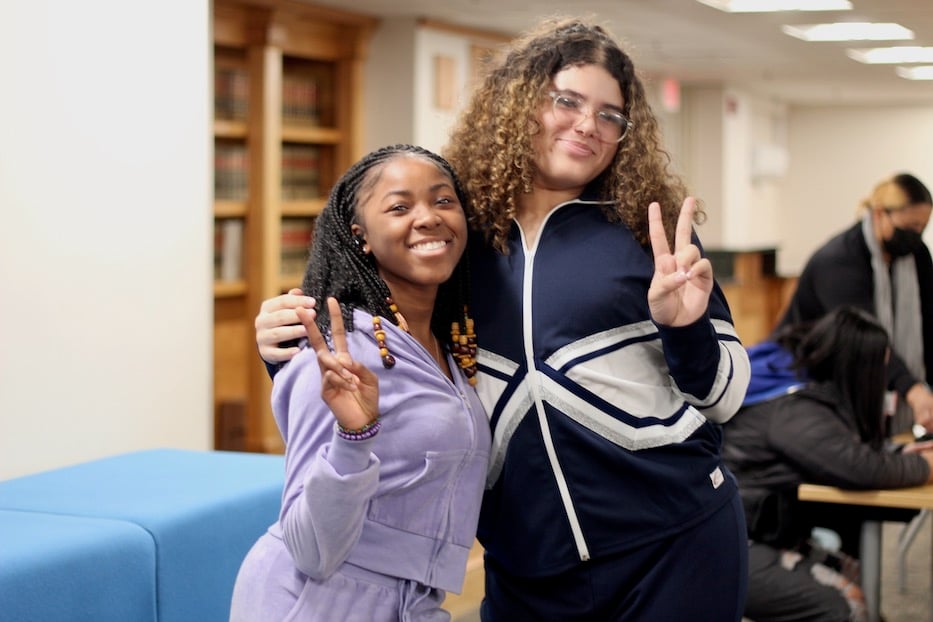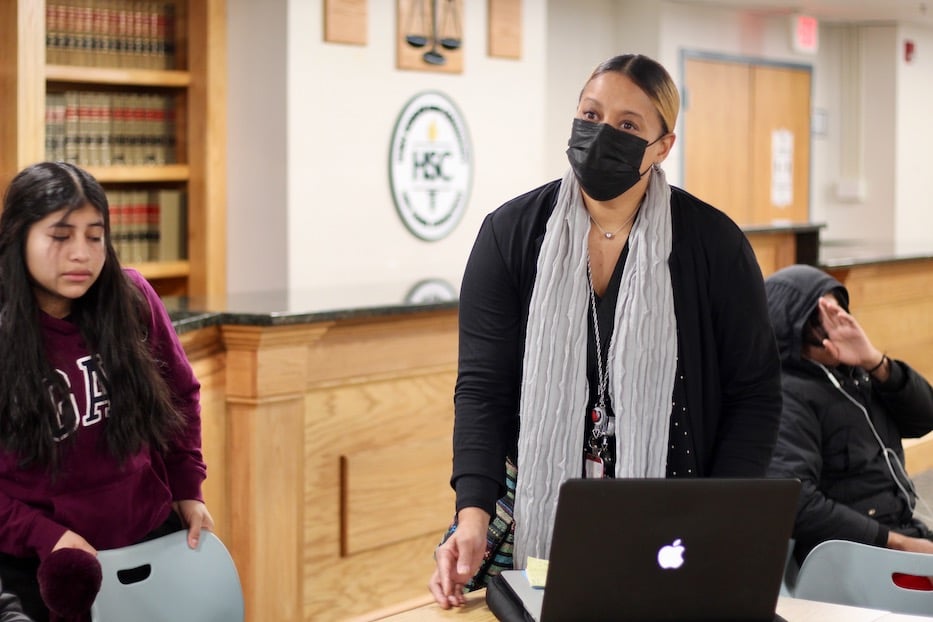
Sayniel Sawmadal and Daniomar Gonzalez. Lucy Gellman Photos.
In a conference room just off Water Street, K-pop was meeting a Spanish-language play for the first time. In a corner, Daniomar Gonzalez and Sayniel Sawmadal whispered their way through a dance number. At a table nearby, Spanish teacher Marlin Rivera chatted in hushed, rapid-fire Spanish, sketching out the bones of a script with two students. Every so often laughter bubbled up from another table, where two students worked intently.
Welcome to the Multicultural “Production Company” or ProCo, a student club now in its fourth year at High School in the Community (HSC). As students get into the swing of a new year, ProCo members are working towards their now-annual multicultural night, planned for May 19 of this year. One year after bringing it back, they are growing the event to include individual and group dances, works of art, poetry, and a top-secret play.
"I think it's beautiful learning about other cultures," said Gonzalez, a junior who leads the ProCo. "It's just amazing. The music, the food, the clothes, the dances, the jewelry—like everything."
ProCos are student-led groups that meet during regular school hours, and usually have an emphasis on student leadership. A decade ago, HSC piloted them when it belonged to a consortium of Higher Order Thinking (HOT) Schools, which prioritize social and emotional learning and multiple intelligence theory. After leaving the state's HOT Schools network, it kept some of the framework.
“We still believe in the vision and impact that these student run classes have on our student body,” Magnet Resource Teacher Dianna Carter wrote in an email Tuesday. “Our current ProCos have evolved from what is described in the HOT literature into more of a class structure that has tangible outcomes.”
Enter the Multicultural ProCo, which has become one of the most popular at the school. Around 2018, Rivera launched the group to give students a space to celebrate, learn about, and amplify both their own cultures and those of their peers. A proud Puerto Rican and 15-year veteran of the school, she wants a place where students can recognize their differences as meaningful and positive, rather than something they should hide.
“I love it. I love every bit of it,” she said on a recent Wednesday.

Marlin Rivera.
It has grown in the past years, reflecting a student body that is as diverse and polyphonic as the city that surrounds the school. Last year, the ProCo’s celebration traveled to Ecuador, Guatemala, Mexico, South Korea, Puerto Rico, and India in a single evening, largely through the arts. Under Rivera’s guidance, students have experimented with the written and performing arts, including a Spanish-language skit that the class wrote itself last year.
With the classroom door closed on a recent Wednesday, students got to work. The sounds of bouncing basketballs in the gymnasium faded instantly. At a table, Rivera checked in with two students, running through the performances they were thinking of. Gonzalez began thinking of this year’s homage to K-pop, which remains a cultural phenomenon four years after her discovery of it. On the wall, the scales of justice hung quietly over a green-and-white school seal.
For Gonzalez, Multicultural ProCo is a safe space: it helped her adjust to HSC after starting her freshman year online. When she first heard about the group, she thought it could be the place to celebrate both her Puerto Rican heritage and her love for K-pop. She’s been hooked on the genre since a friend flipped on a track by Blackpink, a K-pop group of young women while the two were still in middle school.
Gonzalez remembered listening to the track over and over again, interested in learning more about the tradition. She began to teach herself K-pop dances from her Fair Haven home, a point of cultural connection that platforms like YouTube and TikTok have made easier in recent years. She loved the idea of bringing that art form to other students.
"When I read the words 'multicultural,' I seen an opportunity for me to like, come here," she said. "I thought we could dance and all that."
She's very proud of her Puerto Rican heritage, she added—she can pinpoint where her mom hails from in Ponce, and her dad from Aguadilla—but it’s never been a cultural box for her. Last year, she brought a packed cafeteria and standing-room crowd to a roar as she performed Nmixx’s “O.O.”
She added that she loves watching the performances that her classmates come up with, so much so that she stepped into a leadership role this year. On days that students aren’t meeting, they sometimes check in with each other by text, or put in extra time rehearsing at home. Three years in, “It's actually a really good thing for me,” she said.
That’s also true for Sawmadal, a senior who has taken the ProCo as a chance to explore her own interest in K-pop and learn from her peers across cultures. Born to Liberian immigrants in the early 2000s, Sawmadal has long thought about her own West African history, including in a project for the Institute Library's “Social Justice Reader” last year. But the first time she heard the K-pop girl band Twice, it stuck for how refreshing it was.
"It was like, better," she said. "It was really fresh, poppy, and like, Western music was really sad and depressing. All the music was depressing. Listening to Twice's stuff ... it was bringing all this bright, bright energy."
She joined the Multicultural ProCo this year as a way to stay connected to Rivera after taking Spanish classes. So far, she said, she loves it. She’s found that dance and music are just two points of connection: food, and talking about preparation and recipes, is another. When she mentioned culinary traditions, it seemed like every ear in the room pricked up.
"It makes you more open-minded,” she said. “You can tell when somebody shares the same culture … or you can find similarities in yours. You figure out that you have more in common than you think, and it makes you like, 'Okay, I'm not the only one that enjoys this and celebrates this. We all have this in common."'
Senior Alison Escobar, who immigrated to the U.S. from Guatemala when she was 13, said she enjoys the group for the same reason. She likes that peers talk openly about their diverse differences, instead of trying to hide them or assimilate.
“I feel like not a lot of people talk about our differences, our cultures,” she said. “We are looking for people to express themselves, get out of their shells.”